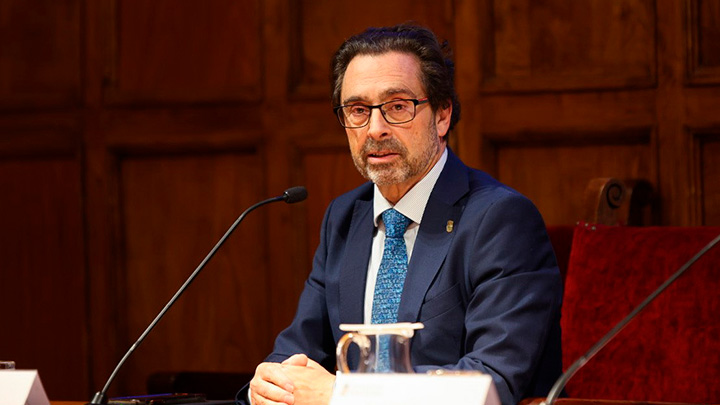Joan Guàrdia is re-elected rector of the University of Barcelona

Joan Guàrdia.
News
|
Institutional
(05/12/2023)
Joan Guàrdia has been re-elected Rector of the University of Barcelona after obtaining 65.89 % of the weighted vote in the Rector's Office elections held on 4 and 5 December. The other candidate, Eugeni Graugés, obtained 34.11 % of the weighted vote. Joan Guàrdia will thus lead the University's government for the next six years.

Joan Guàrdia.
News
|
Institutional
05/12/2023
Joan Guàrdia has been re-elected Rector of the University of Barcelona after obtaining 65.89 % of the weighted vote in the Rector's Office elections held on 4 and 5 December. The other candidate, Eugeni Graugés, obtained 34.11 % of the weighted vote. Joan Guàrdia will thus lead the University's government for the next six years.
In the elections, which took place without any notable incident, more than 54,000 people from the different university groups were called to vote. 6,904 voters cast their ballots, corresponding to 12.58% of the total electorate.
Of the votes cast on these two days of electronic voting, 6,231 were for the candidates and 673 were blank.
Joan Guàrdia Olmos, professor of Behavioural Sciences Methodology in the Faculty of Psychology, has been rector of the UB since December 2020. He joined the UB as a student in the Faculty of Economics and combined his studies with Psychology. An expert in statistics and in the systematic study of human behaviour, he has taught in the Faculty of Psychology, as well as in the Faculties of Pharmacy, Economics and Business, Geography and History, Nursing, Education and Biology.
He has given seminars and courses, and has supervised doctoral theses at various national and international universities. He has published more than thirty books and more than 260 scientific articles, and has been the principal investigator of numerous research projects. He has also held various academic management positions, and is currently a member of the UB Neurosciences Institute (UBneuro) and the Institutes of Complex Systems (UBICS), where he conducts research on quantitative and computational neuroscience.
Of the votes cast on these two days of electronic voting, 6,231 were for the candidates and 673 were blank.
Joan Guàrdia Olmos, professor of Behavioural Sciences Methodology in the Faculty of Psychology, has been rector of the UB since December 2020. He joined the UB as a student in the Faculty of Economics and combined his studies with Psychology. An expert in statistics and in the systematic study of human behaviour, he has taught in the Faculty of Psychology, as well as in the Faculties of Pharmacy, Economics and Business, Geography and History, Nursing, Education and Biology.
He has given seminars and courses, and has supervised doctoral theses at various national and international universities. He has published more than thirty books and more than 260 scientific articles, and has been the principal investigator of numerous research projects. He has also held various academic management positions, and is currently a member of the UB Neurosciences Institute (UBneuro) and the Institutes of Complex Systems (UBICS), where he conducts research on quantitative and computational neuroscience.
